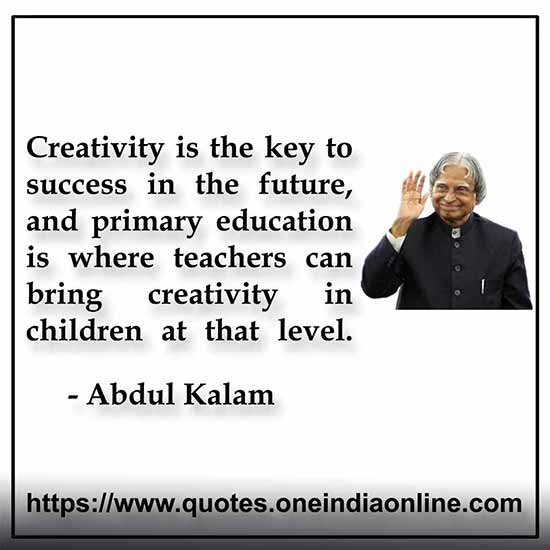Creativity is the key to success in the future, and primary education is where teachers can bring creativity in children at that level.
Thoughts of Abdul Kalam Quotes in English and Quotations

Meaning
In today's fast-paced and ever-changing world, creativity has become more crucial than ever before. It is widely recognized as the driving force behind innovation, problem-solving, and progress. As we look towards the future, fostering creativity in young minds is of paramount importance, and it all begins with primary education.
Renowned scientist and former President of India, Dr. A.P.J. Abdul Kalam, once said, "Creativity is the key to success in the future, and primary education is where teachers can bring creativity in children at that level." These words encapsulate the profound impact that early education and nurturing creativity can have on shaping the future leaders, innovators, and thinkers of tomorrow.
Incorporating creativity into primary education involves creating an environment that encourages exploration, imagination, and out-of-the-box thinking. It goes beyond traditional teaching methods and focuses on empowering students to question, experiment, and express themselves in unique ways. By doing so, educators lay the groundwork for students to develop the essential skills and mindset needed to thrive in a rapidly evolving world.
Dr. Kalam's emphasis on creativity aligns with the growing recognition of the need to prioritize creative thinking in education. In today's digital age, where automation and artificial intelligence are transforming industries and job requirements, the ability to think creatively and adaptively is a highly sought-after skill. By instilling a love for learning and discovery in young learners, educators set them on a path towards embracing challenges with innovation and ingenuity.
As we reflect on Dr. Kalam's inspirational words, it becomes apparent that nurturing creativity in children is a collective responsibility. Parents, educators, and policymakers play pivotal roles in creating an educational landscape that fosters creativity and prepares future generations for success. By integrating arts, project-based learning, and interdisciplinary approaches into the curriculum, we can equip students with the tools they need to thrive in an increasingly complex and interconnected world.
In conclusion, Dr. A.P.J. Abdul Kalam's timeless wisdom serves as a powerful reminder of the transformative potential of creativity in education. It is through nurturing and celebrating creativity in primary education that we can lay the foundation for a future where innovation knows no bounds.
Together, let us embrace and champion creativity as the cornerstone of success for generations to come.